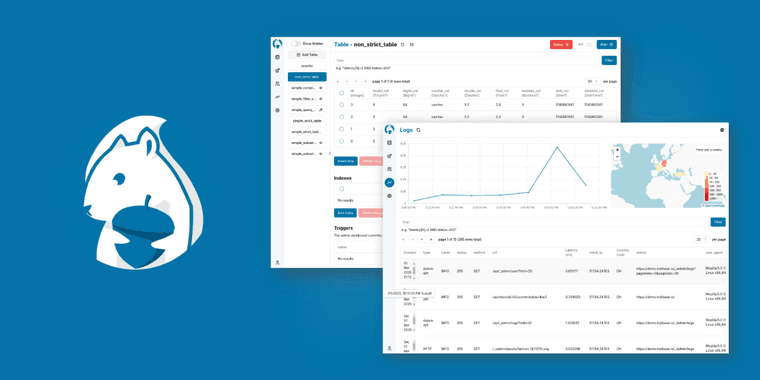Annotation
- Introduction
- WASM Runtime Transition
- File System Enhancements
- Kotlin Integration and Performance
- Pros and Cons
- Conclusion
- Questions fréquemment posées
TrailBase 0.19 : Runtime WASM, Client Kotlin et Mises à Jour de l'API Fichier
TrailBase 0.19 introduit un runtime exclusif WASM, un client Kotlin et des mises à jour de l'API fichier, améliorant la sécurité et l'évolutivité pour le développement backend moderne.

Introduction
TrailBase 0.19 represents a significant evolution for this open source Firebase alternative, introducing WebAssembly-exclusive runtime support alongside a new Kotlin client and substantial file API improvements. This release marks a strategic shift toward modern web standards while maintaining the platform's commitment to type-safe REST and real-time APIs that developers rely on for scalable applications.
WASM Runtime Transition
The most notable change in TrailBase 0.19 is the complete transition to WebAssembly (WASM) as the default execution environment, replacing the previous V8 runtime. This architectural shift enables better performance consistency across different deployment scenarios while providing enhanced security through sandboxed execution. While custom binary builds can temporarily restore V8 support, the development team confirms this is a transitional measure before full removal in future versions. The move to WASM-only execution aligns with modern web development trends and offers improved resource management for applications requiring reliable local web server performance.
File System Enhancements
TrailBase 0.19 introduces breaking changes to file handling by eliminating index-based file reads in favor of unique filename conventions. The new system generates filenames using patterns like {original_stem}_{rand#10}.{suffix}, effectively resolving stale cache issues that previously affected read-after-write operations. This improvement benefits developers working with persistent file storage and enhances data integrity across distributed systems. The changes also complement the platform's strengthened API client capabilities, providing more reliable file management for applications requiring robust data persistence.
Kotlin Integration and Performance
A major addition in this release is the official Kotlin client, expanding TrailBase's language support beyond existing options. The new client provides native Kotlin coroutines support and seamless integration with Android and JVM ecosystems, making it a valuable developer tool. Performance improvements extend to the reworked WASM execution model, which now supports component sharing of executors and implements work stealing for better resource utilization. These enhancements make TrailBase particularly valuable for teams using build tool pipelines and CI/CD tool workflows that demand consistent execution performance.
Pros and Cons
Advantages
- WASM-only runtime improves security and portability
- Official Kotlin client expands development ecosystem
- Enhanced file system resolves cache consistency issues
- Improved executor model boosts scalability
- MUSL Linux builds offer better deployment flexibility
- Stronger access rule validation increases security
- Record subscription filters enable precise data streaming
Disadvantages
- Breaking file API changes require migration effort
- V8 runtime removal may affect existing deployments
- Learning curve for developers new to WASM concepts
- Limited backward compatibility with older versions
Conclusion
TrailBase 0.19 delivers substantial architectural improvements that position it as a forward-thinking application server and alternative to traditional backend services. The WASM-focused runtime, combined with the new Kotlin client and refined file handling, provides developers with a more robust and scalable platform for modern application development. While the breaking changes require careful migration planning, the long-term benefits of improved performance, security, and cross-platform compatibility make this update a worthwhile investment for teams building next-generation web applications with sophisticated REST client requirements and real-time data needs.
Questions fréquemment posées
Quel est le principal changement dans TrailBase 0.19 ?
TrailBase 0.19 passe à un runtime exclusif WASM, abandonne le support V8, introduit un client Kotlin et met en œuvre des changements cassants de l'API fichier avec des conventions de nommage uniques pour une meilleure gestion du cache.
Puis-je encore utiliser V8 avec TrailBase 0.19 ?
Le support V8 est supprimé par défaut, mais les builds binaires personnalisés peuvent le réactiver temporairement. Cependant, une suppression complète de V8 est prévue pour les versions futures, donc la migration vers WASM est recommandée.
Comment le nouveau système de fichiers gère-t-il les noms de fichiers ?
Le nouveau système utilise des modèles de noms uniques comme {original_stem}_{rand#10}.{suffix} pour prévenir les problèmes de cache et assurer l'intégrité des données lors des opérations de lecture après écriture.
Quels avantages en termes de performance WASM offre-t-il ?
WASM offre une exécution en bac à sable, une meilleure gestion des ressources et des performances cohérentes sur toutes les plateformes, améliorant l'évolutivité et la sécurité des applications.
Le client Kotlin est-il compatible avec Android ?
Oui, le client Kotlin s'intègre parfaitement aux écosystèmes Android et JVM, prenant en charge les coroutines pour une programmation asynchrone efficace et un développement moderne.
Articles pertinents sur l'IA et les tendances technologiques
Restez à jour avec les dernières informations, outils et innovations qui façonnent l'avenir de l'IA et de la technologie.
Application de chat Stoat : Guide complet du changement de marque et des fonctionnalités de Revolt
L'application de chat Stoat a été rebaptisée de Revolt en raison de pressions légales, conservant toutes les données utilisateur, fonctionnalités et l'accent sur la confidentialité sans aucune action requise des utilisateurs existants pour une transition transparente.
Zorin OS 18 : Système d'exploitation Linux moderne avec prise en charge des applications Windows et nouvelles fonctionnalités
Zorin OS 18 est une distribution Linux avec un bureau repensé, une prise en charge améliorée des applications Windows et un outil d'applications web, idéale comme alternative à Windows 10 avec un support à long terme jusqu'en 2029.
AV Linux 25 et MX Moksha 25 publiés avec des fonctionnalités améliorées de gestionnaire de fichiers et de machines virtuelles
AV Linux 25 et MX Moksha 25 sont de nouvelles versions de Linux basées sur Debian Trixie, offrant une gestion de fichiers améliorée avec l'intégration de Quickemu et YT-DLP, conçues pour la production multimédia et l'informatique légère.